Daredevil’s Best Story Is ‘Born Again’
It's also my favorite comic book storyline, period.
I’m enjoying Daredevil: Born Again on Disney+. It hasn’t come close to eclipsing the original Netflix show—a high bar indeed—but it’s far better than not having a Daredevil show. I’ll take it.
The subtitle “Born Again” fits a series that has rescued Daredevil from the abyss of cancellation. Plus, the current season involves Matt Murdock finding his way back into the Daredevil role, so it makes sense for the story as well. It also makes sense from the marketing perspective, as longtime Daredevil fans associate “Born Again” with greatness.
The Disney+ show is not an adaptation of the seven-issue storyline that Frank Miller and David Mazzucchelli created in the mid-1980s. Disney is merely employing the branding to help sell the show, which, again, is solid in its own right.
But let’s take the opportunity to reread those classic comics. This isn’t just Daredevil’s best storyline—it’s my favorite comic book storyline of any series. And I’ve read a few.
No matter how many times I reread these books, they always hold up. Each issue always pulls me in and won’t let go. Miller and Mazzucchelli tap into something potent, and they dive all the way in. (Spoilers ahead for these decades-old comics. If you haven’t read them yet, you really should.)
“Born Again” breaks Daredevil, knocks him down to his lowest point, and forces him to climb out of this figurative grave so he can live again. It’s barely a superhero story until the end, with Matt out of costume for the majority of the issues.
“Born Again” ran from Daredevil #227 through #233. The preceding issues had already put Matt through a wringer and set him up for a breakdown. While some of those issues are great too, it’s not necessary to read them first.
The first part opens with Karen Page, whom Daredevil readers hadn’t seen in many years. She was your standard-issue superhero love interest in the original 1960s comics—the pretty blond secretary who fell in love with her boss, the attorney Matt Murdock, but struggled with his dual identity. The comic eventually wrote her out. Karen left New York to pursue a career as an actress in Hollywood. She became a supporting character in Ghost Rider in the 1970s and then disappeared from the panels entirely for several years.
Those years were not kind.
Here, in late 1985, Karen finally shows up again. The once-innocent superhero girlfriend is now addicted to drugs, and the script implies that she’s become a porn star. She’s so addicted and desperate that she sells Daredevil’s secret identity for her next fix.
The information finds its way to the Kingpin, who decides to test its accuracy. Despite being only in the testing phase, he orders the deaths of everyone who came into contact with this intel.
These events, set into motion months ago, catch up to Matt as he’s already at a low point. And the world starts gaslighting him. The power company, among others, is insisting that he did not pay those bills he knows he paid. The IRS chooses now to conduct an audit, and they freeze his assets, preventing him from repaying those bills he had already paid. Worst of all, a highly respected police officer has filed charges of bribery and perjury against him.
The hits keep coming from all directions. Matt goes into action as Daredevil, but he can’t track the source. He doesn’t know who to trust. His already-frayed nerves reach their breaking point. His best friend, Foggy, defends him in court and gets the punishment reduced to disbarment with no prison time. Nevertheless, it’s quite a blow. Matt Murdock has been publicly shamed and humiliated, and he’s still cut off from his own money.
The Kingpin is pleased with his work. He knows he should stop there, let Matt stew a bit longer before perhaps recruiting the broken but talented man into his vast organization. But then, after all his patience and meticulous planning, the Kingpin’s discipline falters. And he blows up Matt’s home, which causes Matt to finally figure out the source of his misery:
I never would have connected it to you. Nothing about it said gangster—until this.
It was a nice piece of work, Kingpin.
You shouldn’t have signed it.
And that’s just part one (and not even all of part one).
Each issue packs in plenty of meat while juggling a sizable cast of mostly non-super characters. The caption narration seamlessly switches between third- and first-person points of view, but it’s always clear and never jarring, even as different scenes plunge us into the heads of different characters.
Miller’s writing style is pulpy, raw, and honest. He lets no metaphor or simile go to waste—for example, “Winter hits Manhattan like an unwanted relative. Drops in with no warning and seems to stay forever.” He ensures we experience what the characters are feeling, and he employs repetition judiciously and effectively.
In one scene, an immensely pleased Kingpin awaits confirmation of Matt’s demise, but then the evidence disappoints. A single short caption repeats three times in three panels, showing how the frustration echoes in his mind and chips away at his spirit:
There is no corpse.
There is no corpse.
There is no corpse.
No cerebral navel-gazing or philosophizing here. It all springs from the heart and hits you in the gut. It’s sincere. It’s almost musical.
The characters matter to each other. Their various threads shoot off and intertwine as the momentum escalates.
Karen flees from goons who are trying to kill her, and she desperately tries to find her way to the only man who can help her—the very man she betrayed.
The Kingpin’s vendetta against Daredevil intensifies into an obsession. The destruction of a good man brings him boundless joy, and the crime boss is riding quite high in the first few issues. But he doesn’t know when to stop.
Foggy stumbles into a relationship with Matt’s ex-girlfriend, a photographer named Glori. Though he’s worried about his troubled friend, his own life is very much on the upswing. Both Foggy and Glori detach from Matt’s orbit and end up happier as a result. They provide a pleasant contrast to Matt’s dark descent.
Daily Bugle reporter Ben Urich has known for some time that Matt is Daredevil, so the perjury charges raise alarm bells from the get-go. Ben is an excellent investigative reporter and a good and honest man, but he’s no hero. When his investigation threatens his life—and his wife—he’s tempted to drop it, and the moral conundrum nearly breaks him.
And then there’s Matt Murdock.
The issue titles and corresponding splash panels illustrate the broad outline of his arc, showing how he sinks lower and lower, then rises anew.
#227, Apocalypse: The destruction of his life. Splash panel: Matt lying on his bed in his own home.
#228, Purgatory: Matt succumbs to a full-on mental breakdown. Splash panel: Matt lying on a ratty bed in a cheap hotel room.
#229, Pariah: Matt is sick, wounded, and homeless as he reaches the point of total physical and mental exhaustion. Splash panel: Matt lying in an alley with fellow homeless men.
#230, Born Again: Under the care of nuns, Matt burns through a fever and regains his physical health. Splash panel: Matt lying in a bed in a church as a nun rejoices that he’s alive.
#231, Saved: Matt is healthy and whole, but he’s not wearing the costume yet. Splash panel: a punching bag lying on the floor as Matt stands over it, having knocked it off its chain.
#232, God and Country: Matt helps Karen through her withdrawal while he gets a job as a cook and bides his time. Meanwhile, the Kingpin aims an unhinged super-soldier, Nuke, at Hell’s Kitchen. Splash panel: Matt comforting Karen as they kneel on his bed, both upright.
#233, Armageddon: Daredevil is back in action as Nuke strikes. Splash panel: This one comes at the end, as a severely wounded Nuke lies on Ben’s desk while Daredevil stands over him, having delivered him to justice.
As the storyline closes, the Kingpin remains the Kingpin, but his obsession has eroded the trust of his subordinates and damaged his public image. His normally rock-solid grip on the city has loosened. But he takes solace in the fact that one victory remains: He succeeded in disbarring Matt Murdock. He took the law from him. Surely that must sting.
But it doesn’t, not right now, anyway. The final page is another splash panel, one of Matt and Karen walking happily in the sunshine. The caption narration sums up the essence of Daredevil:
My name is Matt Murdock.
I was blinded by radiation. My remaining senses function with superhuman sharpness.
I live in Hell’s Kitchen and do my best to keep it clean.
That’s all you need to know.
That’s the resolution, though. The relief happens earlier, in “Saved.”
Karen has run away from a drug dealer who had promised to protect her in exchange for certain favors. But he’s found her—right as Kingpin’s goons have as well. Karen assumes she’s going to die. In what she thinks are her final moments, she grabs some drugs and clumsily prepares to inject herself. Nothing else matters except numbing the pain. But then a billy club, launched with uncanny accuracy, takes down the shooter.
Matt has saved her, and saved a piece of himself as well. These two characters had been separated for years. They’ve both been brought to their lowest points; they’ve lost so much. But at this moment, they finally regain each other. The needle lies abandoned in the snow as Karen hugs Matt for dear life and lets loose years’ worth of tears. This one splash panel pays off the characters’ histories as well as their current plotlines, and it packs in a ton of raw emotion. In the next issue, Matt offers no judgment, only implicit forgiveness.
Put the main character through hell, then allow him to emerge from hell stronger than ever. It’s a timeless strategy, and done right, it can build to a wonderfully satisfying, cathartic conclusion, as it does here.
At the end of #229, the Kingpin thinks:
And I—I have shown him …
… that a man without hope …
… is a man without fear.
But a story like this is built on hope—the hope that no matter how far we fall, no matter who tries to tear us down, we can always pull ourselves back up. It earns that hope along the way and ultimately rewards it.
Captions in #232 read:
—and they took Matt’s home and career and everything—
—no—not everything—
—“Nothing,” he said, Matt did, when she told him what she’d done—
—“I’ve lost nothing,” Matt said, and laughed like a boy—
Not even the Kingpin could reach Daredevil’s soul.


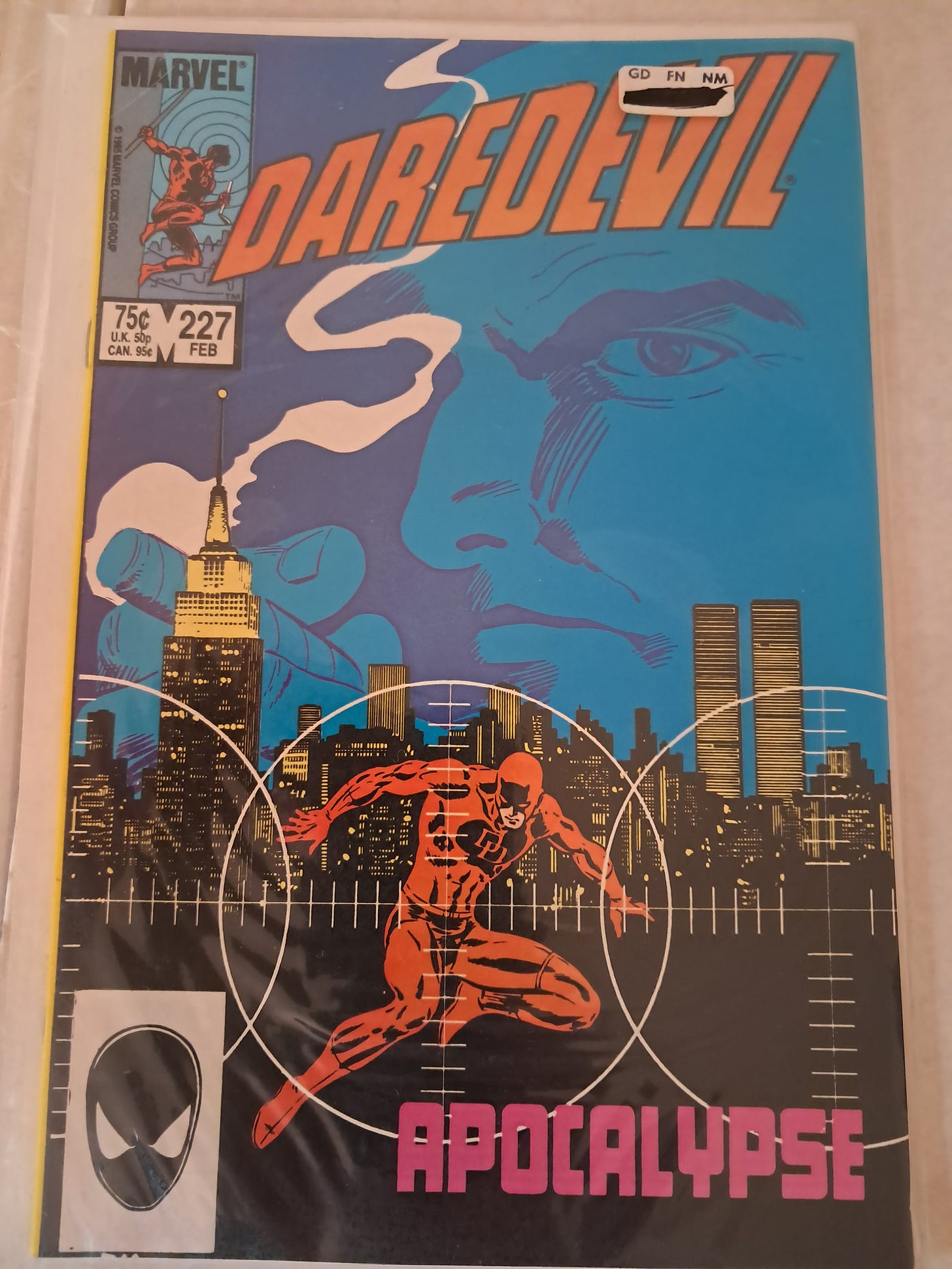
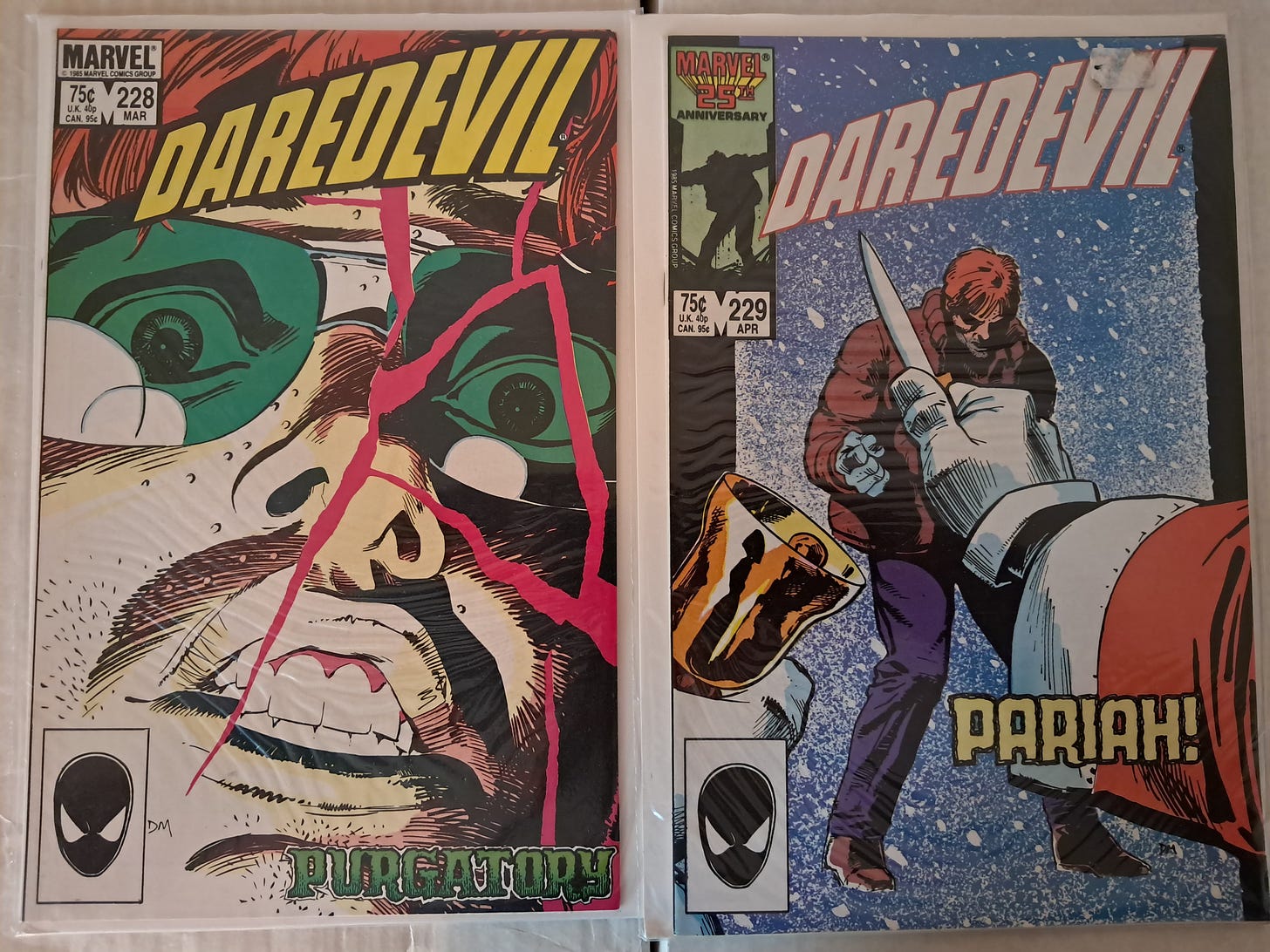
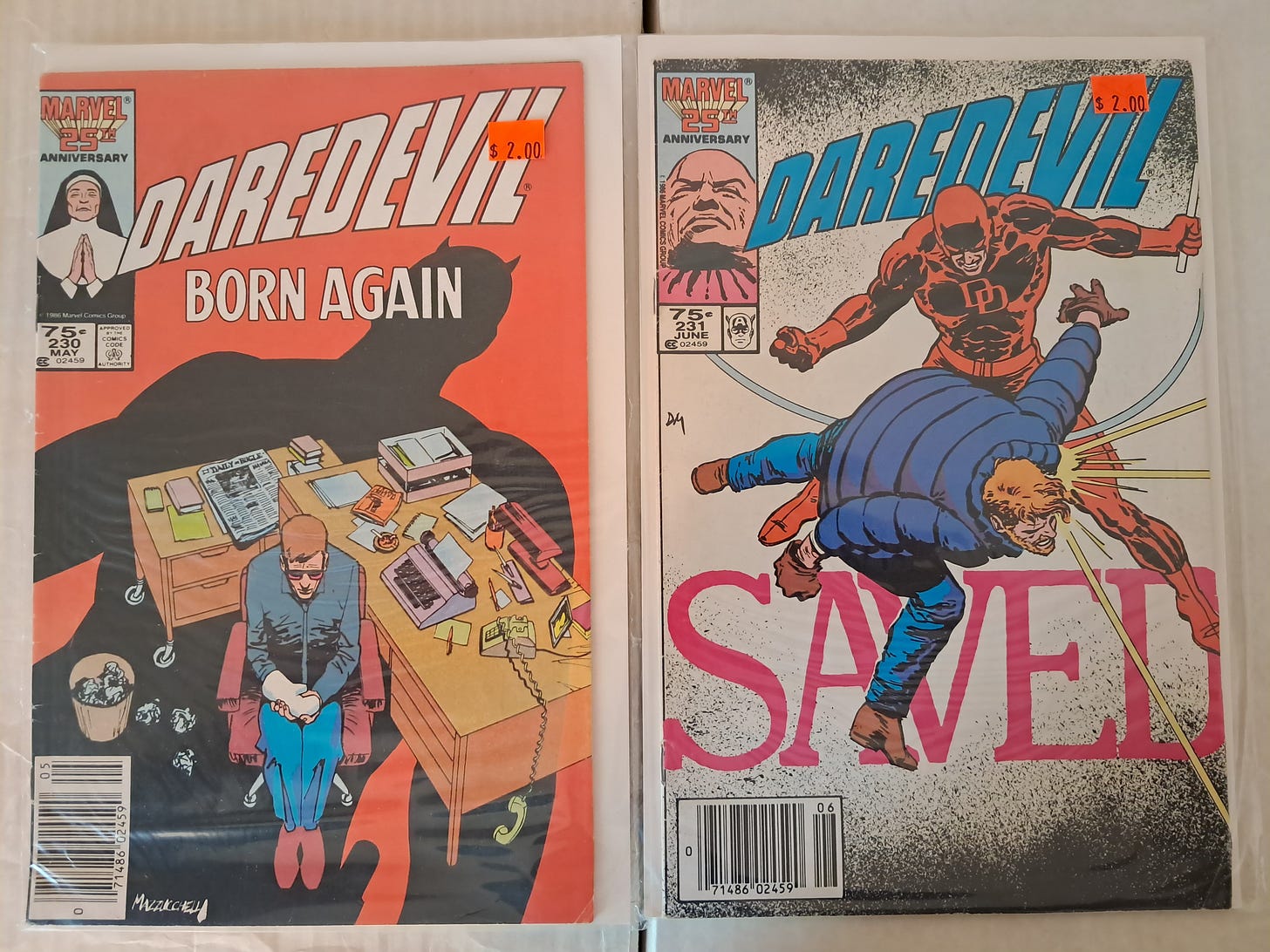
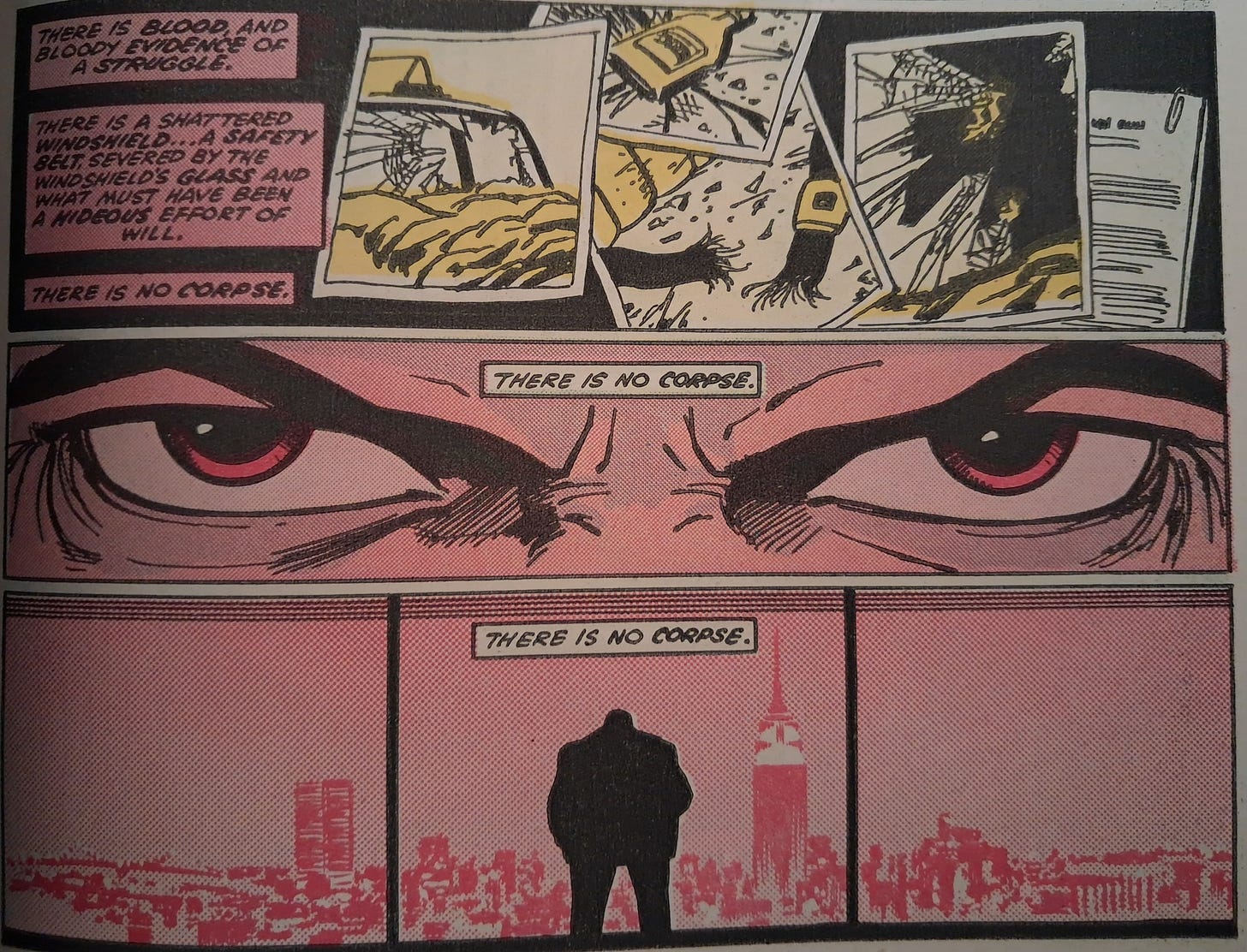
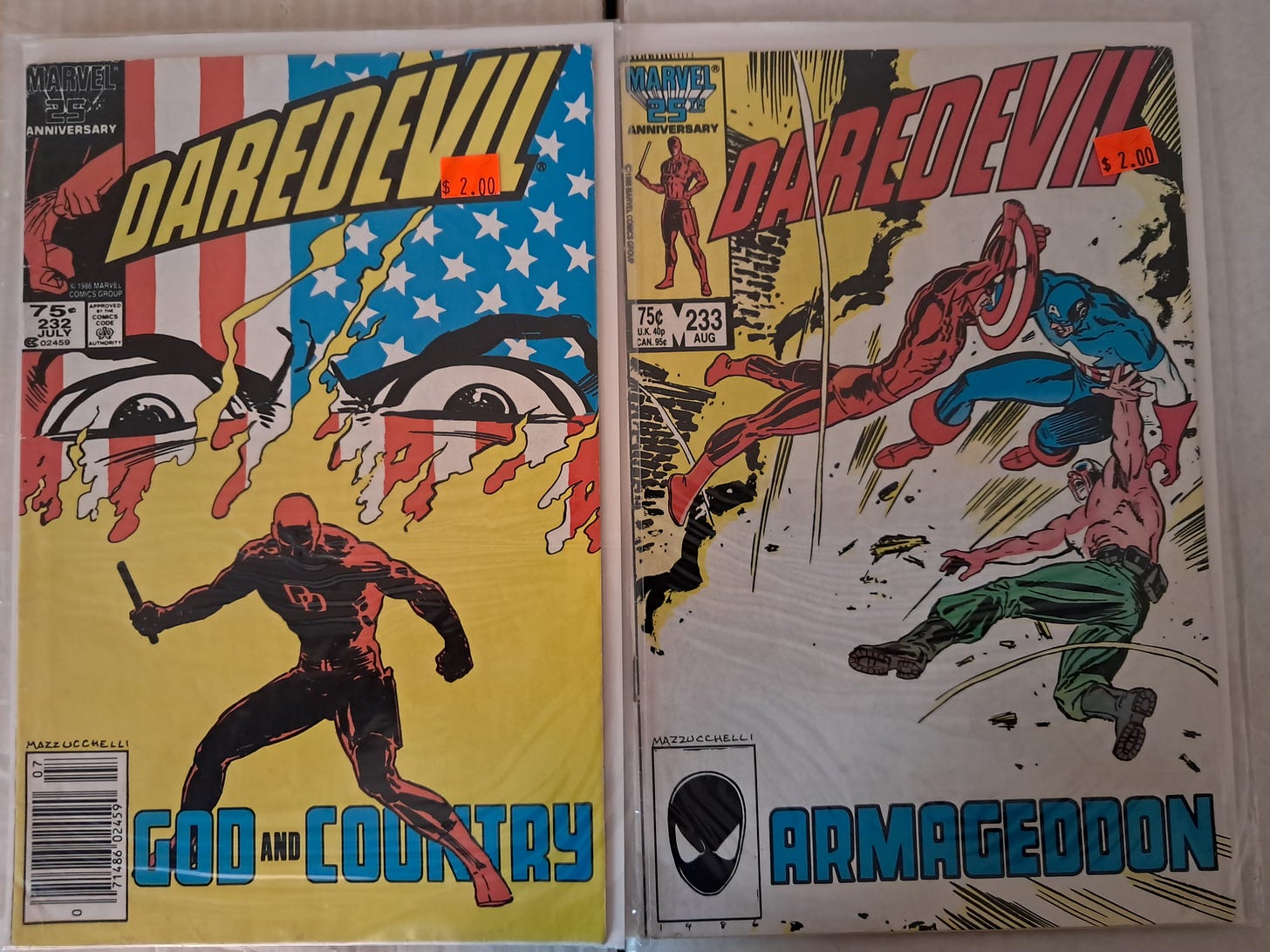
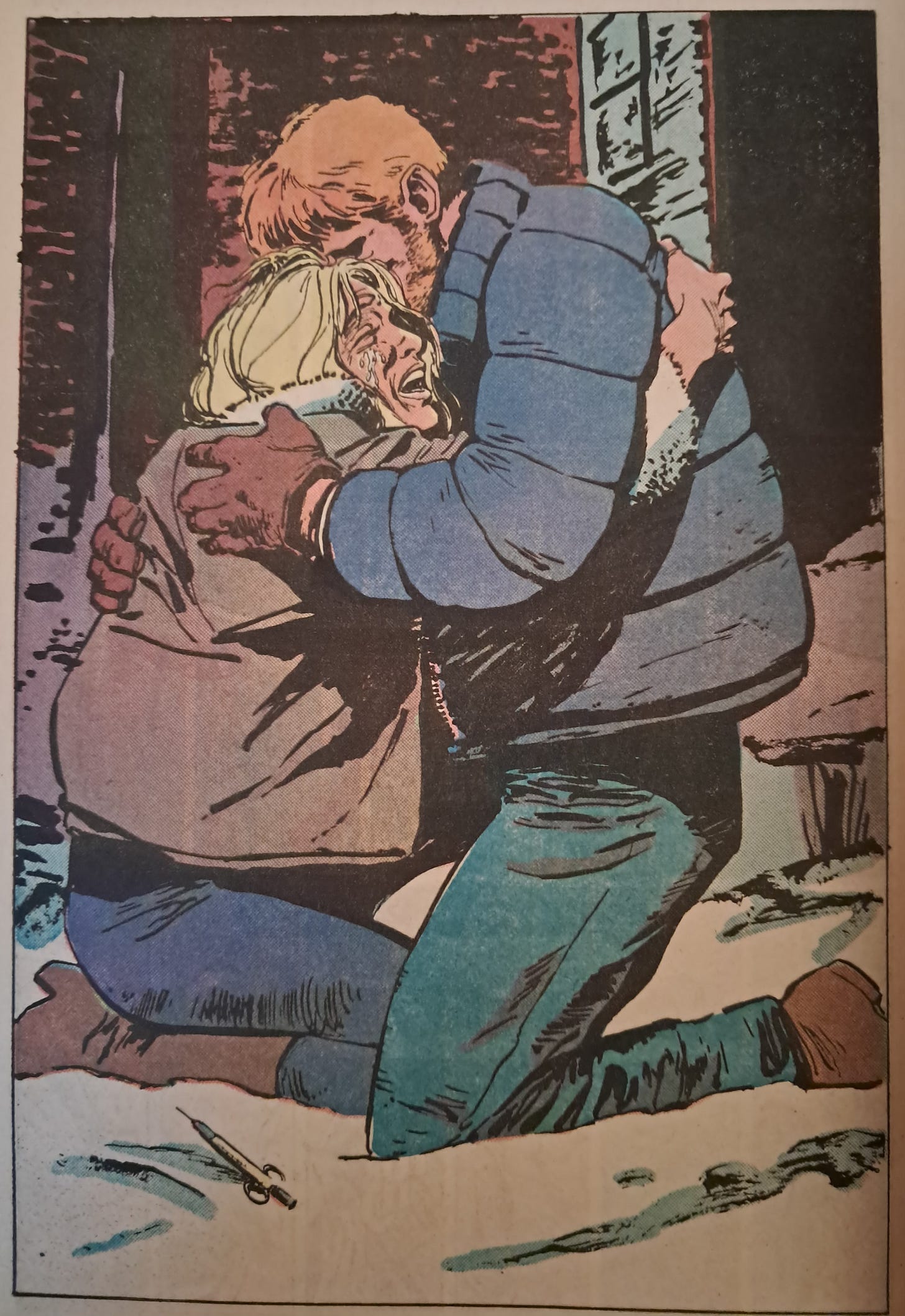
We've talked before about the illusion of change versus real change in stories. This story is powerful because it really changes Matt. His whole life is broken to pieces and never pieced back together again; but he realises by the end that he is stronger in the broken places.
Old-school DD fan here, from the classic Bullseye-Elektra-Kingpin run by Miller, issues 168 thru 182 of the original series (which I still have in the Marvel omnibus edition and read from time to time). I had moved on from the character by this point and didn’t read these until they were collected sometime later…had actually read Miller and Mazzuchelli’s BATMAN YEAR ONE first, which is outstanding. But this is even better. Nice recap, thanks!